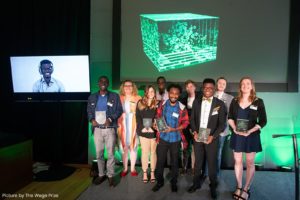Competing for a cause: EARTH students present plans for circular economy at international Wege Prize
 EARTH University students Collins Patrick Ohagwu (’22, Nigeria) and Mastercard Foundation Scholar Komlan Kekeli Batchey (’20, Togo) competed for the 2019 Wege Prize. This international competition seeks to find and reward innovative ideas to redesign the current global economy from a pollutive, linear model (i.e., cradle to grave) to a regenerative, circular model (i.e., cradle to cradle).
EARTH University students Collins Patrick Ohagwu (’22, Nigeria) and Mastercard Foundation Scholar Komlan Kekeli Batchey (’20, Togo) competed for the 2019 Wege Prize. This international competition seeks to find and reward innovative ideas to redesign the current global economy from a pollutive, linear model (i.e., cradle to grave) to a regenerative, circular model (i.e., cradle to cradle).
Held in Michigan, USA, this annual event brings together participants of different academic disciplines and backgrounds. This year, students from 12 universities and of 14 distinct nationalities took part. Such diversity enabled the formation of truly multidisciplinary teams – thus encouraging enrichingly creative, collaborative and thorough work.
For eight months, Collins and Komlan labored remotely with their respective teams. Their teammates resided in countries including USA, Rwanda, South Korea, Kenya, and Ghana – which meant overcoming time-zone differences posed a great challenge. “That was the most difficult part of the project but also the most interesting,” Komlan explains. Nevertheless, thanks to sheer persistence, strong communication, and ample access to modern technology, the teams surmounted the challenge.
During all phases of the project, the spirt of collaboration and unity within the EARTH community inspired other students as well as faculty and staff to support the two young competitors.
For Collins, pursuing the project while concurrently completing his coursework on campus was crucial. That allowed him to receive real-time guidance and to seek specific answers to questions his team (Redent) was grappling with. They proposed a system for employing discarded cacao waste as an organic fertilizer – a necessity in Nigeria, the team members determined. Collins says, “The system – designed to be free of waste as well as economically and environmentally sustainable – aims to inspire cacao producers to employ sustainable agricultural practices.” Thanks to hard work, Redent’s project was named winner of the competition and awarded $15,000 USD in seed funding. “I always wanted to make an impact. That is why I feel really privileged and satisfied to have been part of something like this and to have represented EARTH University, a symbol of sustainability and impact.”
Komlan was part of the team known as Norena Group, which developed a business model to capitalize on pineapple waste – extracting its fibers and utilizing them to create a less-toxic alternative to animal leather. The immediate effect of this initiative would be two-fold: a considerable reduction in the amount of food waste in landfills and a decrease in the number of animals bred for their hides. Norena Group was named a finalist and awarded $1,000 USD. “What the University teaches us is important for life outside of campus. It might not be easy to realize right now, but EARTH prepares us to be not only agents of change but also adaptable to changes.”




